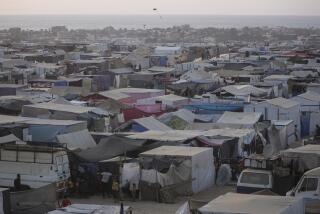Keep War Aims in Proportion : Bush: “We do not seek the destruction of Iraq”
- Share via
What are the war aims of the United States and--to whatever comparable degree--of its partners in the anti-Saddam Hussein coalition?
Obviously: To liberate Kuwait from Iraq’s occupation and control, first and foremost. But an Iraq that retains a predominance of military power with which it can threaten and impose its political will on its neighbors is antithetical to hopes for regional stability. Thus, if in the course of liberating Kuwait, Iraq’s ability to wage aggressive war, not only now but for years to come, is severely weakened, that would not be at odds with United Nations resolutions that call for achieving peace and stability in the Persian Gulf area.
Postwar Iraq may still nurse ambitions to be the neighborhood bully. But a postwar Iraq that has had its brass knuckles taken away is sure to be much less feared. The need to cut the bully down to size no doubt helps explain why Iraq’s nuclear and chemical warfare facilities were made early targets of heavy allied air attacks.
Surely many in the coalition would be delighted if Saddam Hussein were to be removed from power. President Bush, for one, has hinted from the beginning that Hussein’s overthrow by domestic enemies would be welcomed. That could still happen. Or the Iraqi dictator could be killed in an allied bombing attack, although U.S. officials continue to insist that he is not being specifically targeted.
Egypt has made a point of announcing that it doesn’t want to see Iraq’s armed forces destroyed or its regime changed. It’s hard to believe, though, that President Hosni Mubarak would go into mourning if his chief political rival in the Arab world--who has hinted openly that Mubarak is courting assassination--were removed from power.
Under conditions of escalating emotions, clear political objectives are essential in any war. They define when it is time to stop fighting, and what the achievable fruits of victory can be.
No less important than stated war aims is clarity about what is not being sought, so as to calm worst-case apprehensions. President Bush, in an important statement Monday, concisely described U.S. policy in that regard.
“We do not seek the destruction of Iraq,” he told the convention of the National Assn. of Religious Broadcasters. “We have respect for the people of Iraq, for the importance of Iraq in the region. We do not want a country so destabilized that Iraq itself could be the target for aggression.”
These words are intended to reassure Iraqis and others who fear the consequences if a political vacuum is created by Iraq’s military defeat.
The quarrel, Bush made clear, is only with Hussein and his belligerent actions. Washington wants to see a viable Iraq at war’s end. It has no interest in having an Iraq so weak that it could fall prey to territorially acquisitive neighbors.
This is sound and wholly realistic policy. The key aim is stability. That means an Iraq that remains a major player in the region, but no longer the dominating one.
More to Read
Sign up for Essential California
The most important California stories and recommendations in your inbox every morning.
You may occasionally receive promotional content from the Los Angeles Times.













